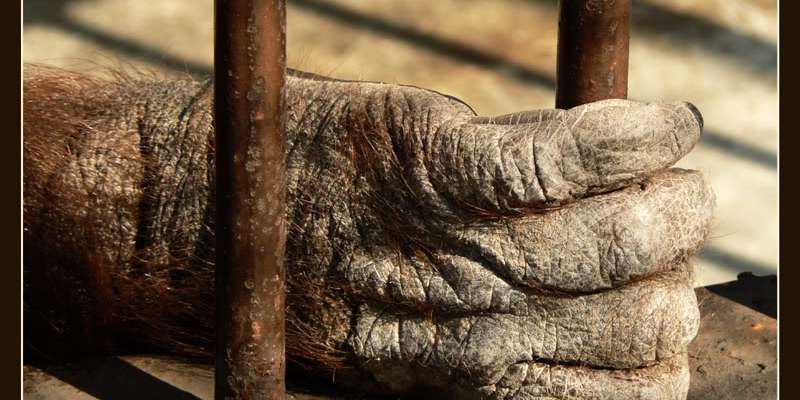Zoos make some people uncomfortable. Many people deplore the sight of wild animals stripped from their natural habitats and confined to a cage. Even when a zoo provides all of the animal’s needs, many people feel that confinement diminishes the animal’s natural glory.
It’s easy to argue that animals are better off in captivity. In captivity they do not starve, nor do they compete over a limited food supply. They do not fear predators. They do not toil to build dens, nests, or beds, nor do they compete for mates. They are inoculated against disease, and are fed diets engineered for longevity. They receive the finest part of their lives exclusively. They are completely secure; the only thing they had to trade is their freedom.
This exchange is stark. The look on the animal’s faces reminds us that the wish for complete security is made to an evil genie who grants it – but at the ultimate price. The zoo shows us that the price is too high. We intuit that freedom is a necessary component of the animals’ nobility, despite the risks it entails. In reality, the security of the zoo is the security of a prison.
What is lost in the exchange? Perhaps most importantly the freedom to assume risk. Maturity for each animal consists of learning how to navigate the risks inherent in its nature, not in avoiding them. We see that we stunt their development by depriving them of their ability to incur risk. Freedom is vital to their nature even if, or especially because it implies risk. They lose their edge, their self reliance, and the sharpness of their instincts. We recognize tragedy in the loss of these traits.
Some will say that the real tragedy of the zoo is that the animals don’t choose their life of confinement. Maybe some of the animals would pick a life of security, while others would choose freedom and risk. Perhaps you could reason with the animals. Perhaps you could say that they would be safer in a zoo. Would they choose it then?
Zoos represent the extreme case. But we feel similarly in less extreme cases. Have you ever seen a wild lion or zebra with a tag in its ear? The animal is tethered to a power he has not chosen to submit too. Have you ever seen the habits of wild animals when they are fed regularly by humans? They lose their focus and become lazy.
We love our pets and our pets depend on us. If we returned them to nature, many would starve, freeze, or succumb to dangers they never learned to manage. As long as they depend on us they do not need their instincts. They are molded by dependence. But their instincts are what make them uniquely them. The more they depend on us, the more instincts they lose. The more instincts they lose, the more they depend on us. As the cycle continues, their autonomous nature vanishes.
Consider now the human animal. Children require risk to learn how to make decisions. This is the very essence of their maturity. When deprived of risks and decisions, children become a stunted version of what our species should grow to be.
This is why I personally disagree with politics that promote security over freedom. I would argue that they blunt our instincts just as they blunt the animals’. Parents who prevent kids from playing sports, politicians who restrict choice in the name of the public interest, teachers who condemn free and critical thinking in the name of established ideas – all of these undermine true human flourishing. They put us in a cage and tell us it’s for our safety.
Flourishing consists of navigating risks, not eliminating them.



















